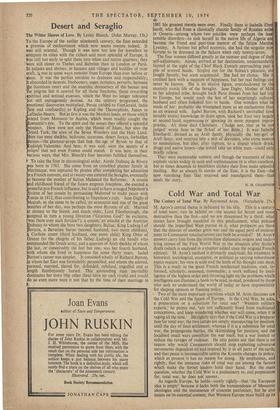Desert and . Seraglio
The Wilder Shores of Love. By Lesley Blanch. (John Murray. 15s.)
To the Europe of the earlier nineteenth century, the East extended a promise of enchantment which now seems remote indeed. It was still oriental. Though it was now too late for travellers to Compare its cities with the richest and most splendid of Europe, it Was still too early to split them into white and native quarters; they I Were still closer to Thebes and Babylon than to London or Paris. In palaces and shrines, in bazaars and villages and huddles of river , craft, it, was in some ways remoter from Europe than ever before or I ;ince. It was the perfect antidote to drabness and respectability; At abounded in despots, freebooters, sages, ecstatics, perverts; between gm licentious court and the anarchic democracy of the bazaar and The pilgrim fair it catered for all those freedoms, those rewarding lepiritual and sensual excesses, which the West no longer tolerated , ut still outrageously desired. As the century progressed, the motional discoveries multiplied; Persia yielded to FitzGerald, India
te and confusedly) to Kipling and the Theosophists, Japan to
• fcadio Hearn. But at first it was the Moslem lands, or those which xtend from Morocco to Arabia, which most readily caught the omantic's eye. To the spirit and the senses they offered a splendid rospect. Here were not only the House of Islam, but also the rand Turk, the sites of the Seven Wonders and the Holy Land. ere too were sheikhs, bedouins, caravans, desert forays, forbidden ines—the glamour-props that link the age of Byron to that of udolph Valentino. And here, it was said, were the secrets of a olupte that not even France could match. It was here, in their arious ways, that Mrs. Blanch's four heroines fulfilled themselves.
P To take the four in chronological order, Aimee Dubucq de Rivery as born in 1763. She came from an ennobled planter family in artinique, was captured by pirates after completing her education a French convent, and at twenty-one entered the Seraglio, eventually become the mother of Sultan Mahmud the Reformer. A cousin d childhood friend of the future empress Josephine, she exerted a owerful pro-French influence, but is said to have avenged Napoleon's vorce of her cousin by persuading Mahmud to make peace with ussia in 1812, thus contributing to Napoleon's ruin. Jane Digby el ■ ezrab, as she came to be called, an aristocrat and one of the great auties of her day, was perhaps the most Byronic of all. Married id sixteen to the bored, and much older, Lord Ellenborough, she ' ccepted in turn a young librarian ('Gracious God!' he exclaims, was there ever such fortune?'), a cousin; an attaché at the Austrian bassy to whom she bore two daughters, Balzac, King Ludwig I of varia, a Bavarian baron (second husband, two more children), Corfiote count (third husband, one more child) King Otho of reece (to the chagrin of his father Ludwig) an old bandit who nded the Greek army, and a quorum of Arab sheikhs of whom a last, or conceivably the last but one, was her fourth husband, ith whom she lived in happiness for some thirty years. Isabel urton's career was simpler. It consisted wholly of Richard Burton, i whom her East was formidably personified, and whom she adored, pursued, married, slaved for, defended, subdued, engulfed and at length flamboyantly buried. This astounding man inevitably dominates her story (the other three have no such rivals) and would do so even more were it not that by the time of their marriage in
1861 his greatest travels were over. Finally there is Isabella Ebel hardt, who fled from a classically chaotic family of Russian exile in Geneva—among whom two suicides were perhaps the low notable disorders—to sink herself in the native life of Algeria an become the friend and part-time mentor of the future Marslu Lyautey. A furious but gifted eccentric, she had the singular mil fortune to be drowned in the Sahara when only twenty-seven.
The four women differed greatly in the manner and degree of the, self-adjustment. Aimee, arrived at her destination, understandabl fainted at the sight of the Chief Black Eunuch approaching past pile of severed heads. Singled out for the Sultan's pleasure, sit fought fiercely, but soon acquiesced. She had no choice. She credited here with a measure of happiness, but her real feelings ca never be known. She is an elusive figure, overshadowed by th steamily exotic life of the Seraglio. Jane Digby, Mother of Mil to her adopted tribe, brought back Paris dresses from her last tri to Europe, but would wash the feet of her surprisingly culture husband and often followed him to battle. One wonders what I made of her; probably she triumphed more as an enchantress tha as an oriental wife. Isabel Burton, with Richard's unrivalled (an notably erotic) knowledge to draw upon, took her East very largel at second hand, suppressing or ignoring its more pungent impre prieties. All three died Christians. ('Judge not, that ye be n( judged' wrote Jane in the flyleaf of her Bible.) It was Isabel Eberhardt, dressed as an Arab dandy, physically the boy-girl ( Arab fancy, and received into a sect of dervishes, who came nearc to assimilation, but also, after rapture, to a dispair which drinl drugs and native lovers—she would take no white man—could onl briefly relieve.
They were memorable women, and though the treatment of the exploits varies widely in taste and sophistication (it is often excellen but at times descends to breathless clichés) their lives make splendi reading. But as always in stories of the East, it is the East-41 now vanishing East that received and transfigured them—tN steals the story. t,
iii
1.43
at
st <, ly H. CHAMPNL ss


































 Previous page
Previous page